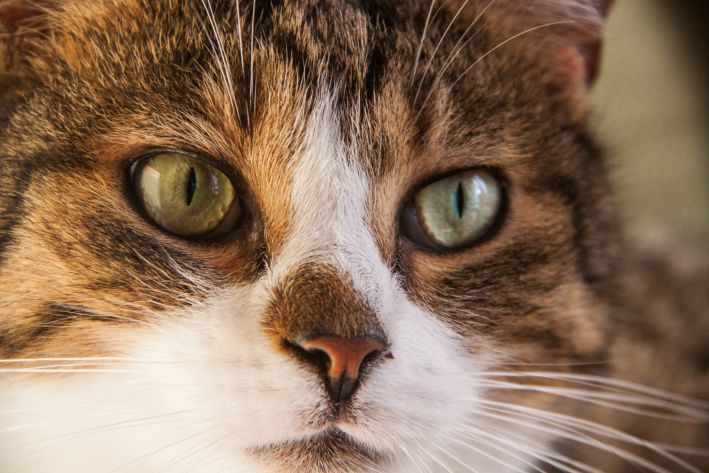- Understanding the reasons
- Consultation with a veterinarian
- Portion control
- Proper nutrition
- Regular meals
- Games and entertainment
- Monitoring
- Reinforcement of positive behavior
- Tolerance and patience
- Avoid overfeeding
- Please note that the storage is closed.
- Switching to dietary food
- Compliance with the regime
- Looking for support
- Continuous monitoring
- Conclusion
What to do if your cat eats too much: don't ignore the problem
Many owners face the problem of excessive food consumption in their furry friends.
This can lead to obesity, disease and other serious health problems.
Understanding the reasons
Before you can treat the problem, it's important to understand why your cat is eating too much.
There are several possible reasons:
a) Breed: Some breeds of cats are more prone to overeating. For example, Sphynxes, Maine Coons, and British Shorthairs are known for their appetites.

b) Stress: Cats may begin to overeat if they are stressed. This can be caused by changes in the environment, other animals, even a change in daily routine.
c) Diseases: Some diseases can increase appetite in cats. For example, hyperthyroidism or diabetes.
d) Boredom: Cats may start eating more than they need if they have no other entertainment. This can happen if they are left alone at home most of the time.
Consultation with a veterinarian
If you find that your cat is eating too much, the first step should be a visit to the veterinarian.
Your veterinarian will be able to conduct an examination and rule out possible medical causes for your cat's excessive appetite. If the problem is related to a disease, you will need specific treatment.
Portion control
If medical causes are ruled out, you should look at portion control for your cat's food.
Determine how many calories she should consume per day and make sure you don't overfeed her.
Depending on your cat's age, size, and activity level, the amount of food to feed may vary greatly. Your veterinarian can help you determine the right amount to feed.
Proper nutrition
Choosing the right food can also help reduce your cat's excessive food intake.
The diet should be balanced and meet the nutritional needs of the cat. You can discuss with your veterinarian what type of food is best for your cat.
Regular meals
Establish a regular mealtime schedule for your cat. This will help her get used to specific feeding times and reduce the temptation to snack between meals.
It may take some time to gradually introduce dietary discipline, but it will become a habit for your cat.
Games and entertainment
To prevent boredom and stress, provide your cat with a variety of toys and entertainment. This will help keep her busy other than eating. Playing, exercising, and being active will help burn extra calories and improve your cat's physical condition.
Monitoring
It is important to monitor your cat's behavior and condition during the diet adjustment process. Keep a record of how much she eats and how she feels. This will help you and your veterinarian monitor changes and make any necessary adjustments.
Reinforcement of positive behavior
Reward your cat for positive behavior. For example, if she follows a feeding schedule or actively participates in play, give her praise or a treat. This will help her associate positive moments with good actions.
Tolerance and patience
Changing your cat's eating habits may take some time. Be prepared for this to be a process that requires patience and tolerance.
Avoid overfeeding
Avoid feeding your cat at the table. Allowing her to "taste" human food can become a habit. Even small pieces of food can add extra calories to her diet. Make sure all family members follow this rule.
Please note that the storage is closed.
Try to store food in closed containers so that your cat cannot access it. This will prevent accidental overfeeding and reduce the chances of eating something that could be harmful to her.
Switching to dietary food
If your cat is truly overweight, your vet may recommend a special diet food to help with weight loss. These foods are usually high in protein and low in calories, which can help reduce appetite and weight gain.
Compliance with the regime
Maintaining a strict feeding schedule is important for cats. Try to create a stable and calm environment around feeding. Avoid feeding her at different times each day, as this can create confusion in her feeding schedule.
Looking for support
If you are having difficulty managing your cat's appetite, don't hesitate to seek professional help. Your veterinarian may recommend an animal behaviorist who can help you develop a strategy for managing your cat's diet and behavior.
Continuous monitoring
Excessive food consumption can be caused by a variety of factors, and it may take time to find the optimal solution. Monitor your cat's health and behavior regularly, and adjust your strategy as needed.
Conclusion
Overfeeding in cats is a serious problem that can lead to various diseases and poor health.
Understanding the causes and using proper nutrition management techniques will help you cope with this problem.
Remember that consulting with your veterinarian is the first step to finding the best solution. Patience is important, as changing habits may take time, but your cat's health is worth it.
Methods for eliminating tear stains in dogs have been reported previously.
